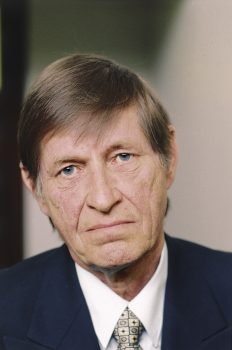Pekka Tarkka
Issue 4/1978
| Archives online, Authors

Erno Paasilinna. Photo: Irmeli Jung
In one of his essays Erno Paasilinna speaks of a modern phenomenon, the ‘quasi-author’. A quasi-author is the kind of literary buff who writes for the papers, takes part in congresses, sits in panels and appears frequently on television. Wherever there is controversy, be it over the function of the President, the legality of strikes, the abortion laws, the evangelical movement or the present state of lyric poetry, the quasi-author is invariably to be found. Paasilinna atones for his irony by freely admitting that he is himself a typical specimen of the breed.
For the concept of the quasi-author Paasilinna refers us back to Ilya Ehrenburg, who noted in his memoirs that the profession of authorship had been undergoing a steady diminution of social and political influence ever since the early 30s. Since Ehrenburg’s day the process has accelerated: television, efficient communications, and the ceaseless output of ‘information’ by what amounts to a major modern industry, have finally toppled the novelist from the throne he successfully occupied for so long. The quasi-author has replaced him, availing himself of all the new media in the hope of achieving a more rapid and direct impact on the public – and perhaps also of preserving the traditional influence of the writing fraternity. Erno Paasilinna was born in 1935 near Petsamo (now Pechenga) on the Arctic coast: from 1922 till 1944 this region was part of Finland. Evacuated during the upheavals of the Second World War, the family was forced to lead the nomadic life of refugees, wandering across the Arctic wastes as far as Norway before they were able to find a settled home in Finland. Erno Paasilinna has not rejected the landscape or the traditions of his native area: he has edited four anthologies of extracts from early accounts of travel in Lapland. It was in Northern Finland, too, that Paasilinna completed his education (he attended the Lapland College of Further Education) and began his writing career. More…

